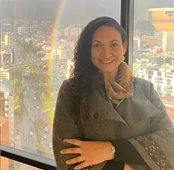Advancing a Public Security Approach for Local Communities in Violence-Prone Areas in Colombia

New Pathways for Human Security and Multilayered Peacemaking in Colombia
(An LSE CRSG & Civic Engagement Project collaboration)
The evolving nature of Colombia’s conflict demands a tailored approach that adapts to the fragmentation and diversity of actors and processes involved
Overview
Colombia is once again at the forefront of peace innovation — finding new ways for societies to confront complex organised violence. From community participation and transitional justice to the gender and ethnic chapters of the 2016 Peace Accord, Colombia has long provided lessons for inclusive and adaptive peacebuilding.
Globally, models of peace and security are evolving as governments and international actors seek to keep pace with rapidly changing forms of conflict. In this context, Colombia is entering a new phase that aims not only to end violence but to transform it. The government’s Total Peace agenda, alongside a new Human Security policy outlined in its National Defence and Security Strategy, recognises the changing nature of organised violence and incorporates innovations centered on community agency. This approach acknowledges that peace is rarely linear: it must be managed by connecting multiple dialogues and negotiations with reforms in security, justice, and inclusion, and grounded in the human security of those most affected by conflict.
This initiative, New Pathways for Human Security and Multilayered Peacemaking in Colombia, examines how this transformation is unfolding. It explores how Colombia’s evolving peace and security architecture can move beyond territorial control toward protection, participation, and dignity — linking human-security principles with adaptive forms of mediation and governance.
Led by the Civic Engagement Project (CEP) and the Conflict and Civicness Research Group (CCRG) at LSE IDEAS, the initiative combines comparative research, practitioner dialogue, and civic insight to connect evidence from communities with national and international policy debates on peacemaking and security reform. Other CEP–CCRG collaborations include the Afghanistan Research Network.
Publications
Human Security in Colombia: Four Opportunities for a Strategy Shift
By Andrea Guardo, Jan 15, 2023
This policy report identifies four opportunities to embed human-security principles in Colombia’s evolving peace agenda: shifting from territorial control to inclusion, countering organised-violence groups, integrating citizen knowledge, and transforming institutional behaviours within the security sector.
Read policy brief / Download PDF
Public Security for Communities in Colombia, 2025
By Marika Theros, Andrea Guardo, Ben Acheson
This research and engagement initiative supports the development of innovative, community-centered approaches to peace and public security in Colombia, with a focus on the violence-affected regions of Chocó and Nariño. Drawing on field visits, engagements with key stakeholders and community consultations conducted in mid-2024, the initiative explores how Colombia can operationalize an integrated peace and human security approach to reduce violence, center local agency, and connect national peace efforts with local realities.
The report (English/Spanish) sets out a framework for addressing the layered peace and security challenges faced by communities in Colombia’s Pacific region, especially Indigenous and Afro-descendant populations. It reflects both national-level discussions and the specific challenges and opportunities of two regions – Nariño and Chocó.
To inform how peace and protection are delivered in areas still grappling with organized violence, the report proposes:
- Developing community-informed peace and security metrics and indicators
- Advancing the operationalization of human security at both strategic and tactical levels through pilots in Nariño and Chocó
- Designing territorial ceasefires and de-escalation efforts that enable the local co-construction of peace
- Strengthening women’s agency and inclusion by analyzing how armed groups use gender-based violence as social control and incorporating those insights into new peace and security frameworks
- Convening a regional meeting of defense ministers to promote a rights-respecting security agenda across Latin America
- Strengthening transformative communications for a rapidly evolving context
- Supporting governors to highlight the security–development–biodiversity nexus
- Advancing financing and development strategies for territorial peace and security
- Elevating community actions into a national "Visioning Process" to build legitimacy for local and national peace initiatives
- Supporting a Peace and Human Security Forum to pioneer a Global South approach to peace and security
Fieldwork was done in collaboration with the Colombian organization, Corporación Grupo para el Desarrollo Social (Social Development Group) and Ficonpaz. The project and report was funded by the Open Society Foundations. The content and views expressed herein are solely those of the authors and do not necessarily reflect the views of the Open Society Foundations. This report is adapted from a previous memo written in October 2024.
Read the report here in English and here in Spanish


